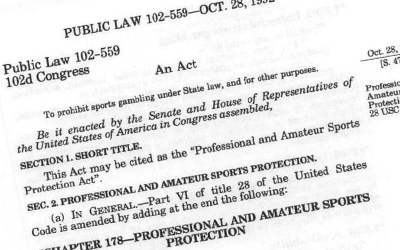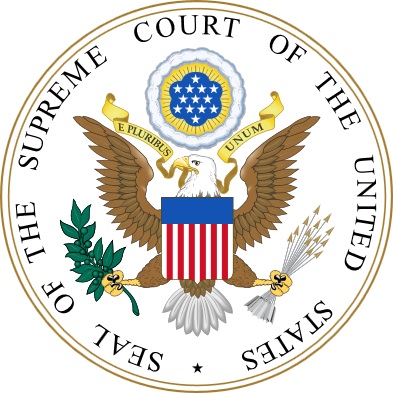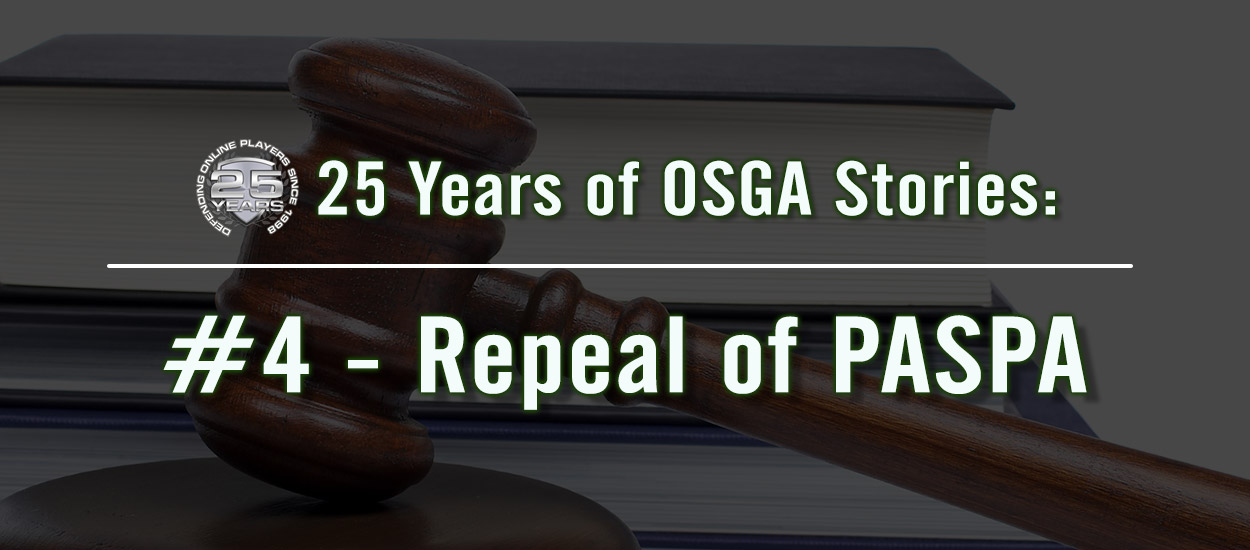When SCOTUS repealed PASPA sports betting in America changed
In 1991, the Senate Judiciary Subcommittee on Patents, Copyrights and Trademarks held public hearings on sports gambling. The committee determined that sports betting represented a threat to the integrity of sports and was a national problem. The committee said that the U.S. needed a federal law to disallow states the opportunity to legalize sports betting moving forward (sports betting between states was still illegal under the Wire Act). Congress picked up the bill and introduced the Professional and Amateur Sports Protection Act (PASPA). The wording of the bill indicated that a law was necessary to protect sports from corruption which they deemed was likely to happen through game fixing. They also suggested it was a health issue and the law was needed to protect problem gamblers. The bill was supported by the NBA and, since former NBA star Bill Bradley was a member of the Senate, they pushed the bill forward, and it was nicknamed the Bradley Bill.  The bill provided an exemption to any states that already had sports betting and it gave a one year opportunity for states with legal casinos to opt out of the bill. This was clearly aimed at New Jersey, which saw Atlantic City casinos growing in popularity at the time. Consequently Delaware, Oregon and Montana, which had previously run sports lotteries were given an exemption under the bill, even though those lotteries were discontinued. New Jersey allowed the year to pass by without opting out of PASPA and as a result, they, along with the other 45 states not provided an exemption, were not permitted to offer sports betting in any form.
The bill provided an exemption to any states that already had sports betting and it gave a one year opportunity for states with legal casinos to opt out of the bill. This was clearly aimed at New Jersey, which saw Atlantic City casinos growing in popularity at the time. Consequently Delaware, Oregon and Montana, which had previously run sports lotteries were given an exemption under the bill, even though those lotteries were discontinued. New Jersey allowed the year to pass by without opting out of PASPA and as a result, they, along with the other 45 states not provided an exemption, were not permitted to offer sports betting in any form.
The law never really became an issue again until the financial crisis of 2008. One of the hardest hit industries was gambling, so casinos and racetracks in New Jersey asked the state for the ability to offer sports betting to attract more customers and raise revenues at the facilities. Delaware similarly decided it would offer sports betting at its racetracks to help generate interest and draw more customers to the tracks. New Jersey decided to hold a referendum on sports betting in 2010 as part of the midterm elections and at the urging of Governor Chris Christie, the populace voted by a 3-2 margin to legalize sports betting. The law was agreed to by the legislators and in early 2012 the state passed the bill into law. The New Jersey law, however, was immediately challenged by all the leagues, saying it was invalid since it violated PASPA. But the state argued that PASPA was irrelevant, since PASPA itself violated the 10th amendment, which gave the states the right to pass any laws in social areas, like gambling. Attorneys for the leagues pointed out that New Jersey had the opportunity to opt out of PASPA, but chose not to and the state’s defense of that was effectively that "things change." The case went to various courts who ruled that New Jersey couldn’t enact the law since it violated PASPA, but they had the ability to repeal any existing laws on its own books. This provided them the opportunity to enact the new sports betting law immediately, if PASPA itself was ever repealed. New Jersey did just that in 2014. As for Delaware, the Delaware Supreme Court acknowledged that Delaware indeed had the right to offer sports betting due to their exemption, but were restricted to parlay bet cards that they offered when they had a lottery and only on NFL games. The state’s hopes of offering single game sports betting at the racetracks on all sports was not allowed.
It appeared there was going to be a major standoff between the leagues and the states until 2014 when NBA Commissioner Adam Silver, who had just replaced David Stern wrote the following in an op-ed piece in the New York Times titled "Legalize and Regulate Sports Betting".
“There is an obvious appetite among sports fans for a safe and legal way to wager on professional sporting events. Mainstream media outlets regularly publish sports betting lines and point spreads. Voters in New Jersey overwhelmingly voiced their support for legal sports betting in a 2011 referendum . . .
Outside of the United States, sports betting and other forms of gambling are popular, widely legal and subject to regulation. In England, for example, a sports bet can be placed on a smartphone, at a stadium kiosk or even using a television remote control.
In light of these domestic and global trends, the laws on sports betting should be changed. Congress should adopt a federal framework that allows states to authorize betting on professional sports, subject to strict regulatory requirements and technological safeguards.”
The comments seemed to take the commissioners of other major sports leagues by surprise, including those in baseball and hockey, who said that they didn’t support Silver’s comments, claiming it would lead to people rooting for the spread rather than for the team to win, which would affect the integrity of the game. NFL Commissioner Robert Goodell was adamant that the NFL would never support legal sports betting. However, in the years following, the commissioners of MLB, NHL and eventually the NFL dropped their opposition to legalized sports betting even if they weren’t prepared to openly condone it. The one exception was the NCAA who said that they would never support legalized gambling on college games due to the possibility of game fixing by students who likely would never be good enough to make it to the pros but could make a killing by helping fix games.
NJ and the Supreme Court
By 2016, the New Jersey lawsuit to legalize sports betting was sent to The United States Supreme Court (SCOTUS) and it was expected it would either be denied or put off for a few years but to the surprise of almost everyone, SCOTUS actually asked to hear the case. The lawsuit which became known as Murphy (Governor of New Jersey) vs. National Collegiate Athletic Association was heard by the 9 judges in December 2017 and decided on in May 2018.  The pro gambling side, which included the state of New Jersey and the horse racing associations, argued that PASPA violated the 10th amendment by the commandeering clause, which says that laws that do not violate a person’s right (such as segregation) is always left to the states to decide for themselves. The anti-gambling side, which was mildly supported by the pro leagues and NCAA, argued that PASPA was legal under the Supremacy clause of the 10th amendment, stating that the federal courts have the right to initiate rules across the U.S. that are in the country’s best interest. After hearing arguments from both sides, along with questions asked by the justices, it seemed clear that SCOTUS was leaning towards repealing PASPA. On May 14, 2018 they did just that in a 6-3 ruling divided almost exclusively on party lines. All the Republican justices and Elena Kagan voted to repeal PASPA, while Democrats Ruth Bader Ginsberg, Sonia Sotomayor and Stephen Beyer dissented. The court ruled effectively that the 10th amendment allows any states to pass rules that do not violate the basic rights of its citizens, and since gambling is not a basic human right it should be left to the states to decide. By enacting PASPA, the court said that the federal government was commandeering states rights and this exact reasoning has allowed different states to enact separate laws on gun control, marijuana legalization, immigration policies and most recently access to abortions. Coincidentally, when PASPA was passed in 1992 the U.S. Attorney General at the time said that he thought PASPA may be unconstitutional and challenged at some point. It must be noted that only intrastate betting is legal, since interstate betting is still illegal under The Wire Act, although most analysts suspect that SCOTUS will revisit that law at some point too.
The pro gambling side, which included the state of New Jersey and the horse racing associations, argued that PASPA violated the 10th amendment by the commandeering clause, which says that laws that do not violate a person’s right (such as segregation) is always left to the states to decide for themselves. The anti-gambling side, which was mildly supported by the pro leagues and NCAA, argued that PASPA was legal under the Supremacy clause of the 10th amendment, stating that the federal courts have the right to initiate rules across the U.S. that are in the country’s best interest. After hearing arguments from both sides, along with questions asked by the justices, it seemed clear that SCOTUS was leaning towards repealing PASPA. On May 14, 2018 they did just that in a 6-3 ruling divided almost exclusively on party lines. All the Republican justices and Elena Kagan voted to repeal PASPA, while Democrats Ruth Bader Ginsberg, Sonia Sotomayor and Stephen Beyer dissented. The court ruled effectively that the 10th amendment allows any states to pass rules that do not violate the basic rights of its citizens, and since gambling is not a basic human right it should be left to the states to decide. By enacting PASPA, the court said that the federal government was commandeering states rights and this exact reasoning has allowed different states to enact separate laws on gun control, marijuana legalization, immigration policies and most recently access to abortions. Coincidentally, when PASPA was passed in 1992 the U.S. Attorney General at the time said that he thought PASPA may be unconstitutional and challenged at some point. It must be noted that only intrastate betting is legal, since interstate betting is still illegal under The Wire Act, although most analysts suspect that SCOTUS will revisit that law at some point too.
States embrace PASPA repeal
In anticipation of the ruling, Delaware, Mississippi, Connecticut, Pennsylvania, and West Virginia all passed sports betting legalization bills to allow them to launch immediately, once PASPA was repealed, and both New Jersey and Nevada had already had sports betting legislation in place. By 2020, Colorado, Illinois, Indiana, Iowa, Montana, New Hampshire, New York, Oregon, Rhode Island, Tennessee, and the District of Columbia all offered licensed and regulated sports betting. In the years since 2020 Arizona, Kansas, Louisiana, Maryland, Massachusetts, Nebraska, New Mexico, Ohio, Virginia, Washington, Wisconsin, and Wyoming all started accepting sports bets. Kentucky, North Carolina, and Vermont all passed legislation and are expected to operate within the next year. Florida also passed a sports betting law that gives exclusive rights to the Seminole tribes to take wagers, but that issue is still before the courts as a casino and pari-mutuel operation are challenging the legality of the compact under the IGRA. That means that currently 33 of the 50 states have sports betting laws in place, along with D.C. It is believed that by 2030 the only states that will definitely not have any laws in place legalizing sports betting are Alaska, Utah and Hawaii, along with some states in the Bible Belt.
The states all have different rules and tax rates. New York has been criticized greatly for the 51% tax for online sports betting and the inability to bet casinos online and Pennsylvania has been criticized as well for the 36% tax on bets. States like Oregon and New Hampshire have state monopolies allowing only the lottery to run sports betting, both states using DraftKings as the sports betting app, and a few states like Delaware and a few others only allow retail sports betting at casinos and/or racetracks. Some states also disallow betting on college sports, while others restrict betting on NCAA games that are in-state. Most states also limit the betting to strictly sports, meaning that residents can’t bet on events like the Academy Awards or elections. So, the repeal worked exactly as planned with each state only allowing betting only on what they are comfortable with and with a tax rate they believe is reasonable. This proves that states gave the right argument.
The states have all done extremely well, generating significant revenue for state coffers with New Jersey, Pennsylvania, New York and Michigan leading the way. The sportsbooks on the other hand are still not profitable due to excessive tax rates and we are starting to see some consolidation with companies like PointsBet selling their operations. FanDuel (owned by Flutter Entertainment), Draft Kings, BetMGM and BetCaesars are by far and away the four biggest sportsbooks in the U.S. and it is expected that won’t change any time soon although BetFanatics could become a major player once they launch.
So, what seemed virtually impossible just a decade ago in the United States is now commonplace. It’s almost impossible to live in a state that has regulated sports betting and not see constant advertisements for sports gambling on TV, billboards, uniforms and arena walls are everywhere. Moreover, one can’t watch a football, NASCAR or golf broadcast without hearing the updated odds from the sportsbook that has a deal with the networks. While there are calls by some to try and curtail the amount of advertising, it can’t be argued that sports betting has been a boon for many state economies that have been struggling due to hits to their coffers initiated by the COVID-19 pandemic. Most importantly, for libertarians and those who value personal freedoms the repeal of PASPA has given bettors a right they should have always had. It is notable that while the repeal took a big hit out of the illegal underground bookmakers it has not had a devastating effect on offshore sportsbooks that still get good action from American bettors who value some of the incentives, they can get offshore that they can’t with legal state betting. In the end, the ruling to overturn PASPA by SCOTUS was the right one and it is providing benefits that states and bettors had wanted for decades.
Read insights from Hartley Henderson every week here at OSGA and check out Hartley's RUMOR MILL!








































